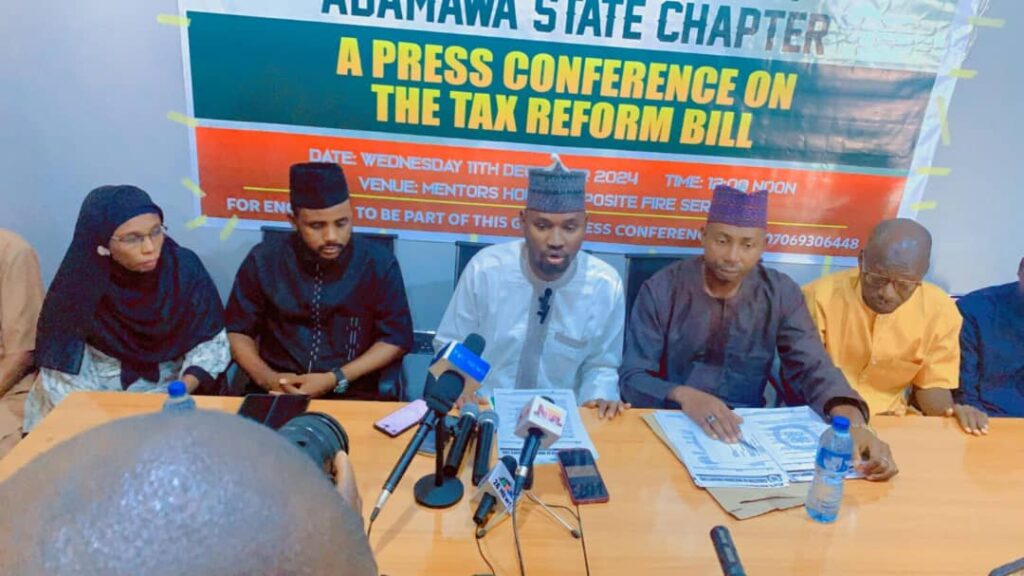From Joseph Asegba, Yola
The Adamawa State Coalition of Northern Groups (ASCNG) has disassociated itself from the newly introduced tax reform bill by the federal government, expressing strong opposition to the federal economic policies.
In a statement, ASCNG called for the “immediate suspension of the reforms,” arguing that the proposed tax measures threaten the well-being of the people of Adamawa State, the northern region, and Nigeria as a whole.
At a press conference organized by the coalition’s coordinator, Mr. Abubakar Daware, concerns were raised about the growing economic hardships faced by ordinary Nigerians.
Daware remarked, “In recent months, life has become increasingly unbearable for ordinary Nigerians due to a series of economic policies that have imposed immense hardship on the people.”
He pointed to the harmful effects of the removal of subsidies on essential services such as fuel, electricity, foreign exchange, and education, noting that these changes have exacerbated inflation, deepened poverty, and strained the resilience of millions.
To further compound the hardship, Daware emphasized that the federal government’s proposed tax reforms, if implemented, would only worsen the fragile economic situation.
He characterized the proposed reforms as “ill-timed and inequitable,” warning that they could push Adamawa State and Northern Nigeria into even deeper economic distress.
He called for immediate redress, stating, “We are here to call for urgent action, propose practical solutions, and ensure that the voices of our people are heard and respected.”
Among their demands, the coalition insisted that deliberations or implementation of the tax reforms be halted until broad-based consultations are held with all stakeholders, including representatives from Northern Nigeria, civil society organizations, and community leaders.
Daware also criticized the current revenue-sharing formula, which allocates 20% for equality, 20% for population, and 60% for derivation, calling it “unequal and disadvantageous” to Adamawa State and the Northern region.
To address this imbalance, ASCNG proposed a revised revenue-sharing formula, suggesting 40% for equality, 30% for population, and 30% for derivation.
“This adjusted formula reflects the collective contributions of all regions and promotes equity, ensuring that the welfare of non-producing states like Adamawa is not overlooked,” Daware explained.
The coalition also urged the federal government to introduce meaningful economic palliatives to alleviate the impact of the reforms.
These measures should include targeted subsidies, access to affordable loans, and support for small-scale farmers and traders.
Additionally, Daware emphasized the importance of reopening land borders to revitalize cross-border trade, which has been severely affected by border closures.
He pointed out that Adamawa State’s proximity to Cameroon makes it a vital trade corridor, and continued border closures have undermined the livelihoods of farmers, traders, and transporters.
The coalition further called for prioritizing the dredging of River Benue to address flooding, improve agricultural yields, and unlock new economic opportunities for the state.
They also advocated for investments in upgrading power infrastructure to ensure a reliable and consistent electricity supply, as well as exploring renewable energy solutions to bridge the energy deficit and reduce reliance on fossil fuels.
In conclusion, Daware emphasized the critical role of Adamawa State and the Northern region in Nigeria’s socio-economic stability and development. “It is imperative that the Federal Government adopts policies that are inclusive, equitable, and responsive to the realities of our people,” he stated.
The Adamawa State Coalition of Northern Groups is calling on the Federal Government, the National Assembly, and all relevant stakeholders to act swiftly and decisively to address these pressing issues.
As the coalition rallies support for their cause, they aim to ensure that the voices of the people are heard and that their needs are prioritized in the ongoing economic discourse.


